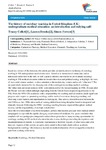The history of sociology teaching in United Kingdom (UK) undergraduate medical education: an introduction and rallying call!
| dc.contributor.author | Collett, Tracey | |
| dc.contributor.author | Brooks, L | |
| dc.contributor.author | Forrest, S | |
| dc.date.accessioned | 2017-03-06T16:45:34Z | |
| dc.date.accessioned | 2017-03-07T10:40:27Z | |
| dc.date.available | 2017-03-06T16:45:34Z | |
| dc.date.available | 2017-03-07T10:40:27Z | |
| dc.date.issued | 2016-12-16 | |
| dc.identifier.issn | 2312-7996 | |
| dc.identifier.issn | 2312-7996 | |
| dc.identifier.uri | http://hdl.handle.net/10026.1/8595 | |
| dc.description.abstract |
Based on a review of the literature, this article provides an introduction to the history of sociology teaching in UK undergraduate medical education. Aimed at an international community and at individuals either new to the field or with a general interest, our objectives are to situate sociology teaching in UK medical education within its broader historical and political setting, to highlight the work of past social science teachers, to draw attention to the modern day context and to ask: ‘what now’? We are particularly interested in the changing role of the sociologist in teaching medical sociology. The behavioral and social sciences (BSS) were introduced to UK medical training in 1944, 34 years after the Flexner reforms (which although originating from the United States impacted significantly on the UK). From the 1970s UK academics with a responsibility for teaching medical students made significant progress with respect to: promoting sociology within medical education, designing teaching, and observing where barriers and opportunities to learning lie. This activity slowed however between the mid 1980s and late 1990s when medical training shifted from being discipline based to integrated and clinically focused. Following the 1990s’ sociology teaching became dispersed throughout medical training and the responsibility of multiple stakeholders. Since the new millennium it has been recognized globally that trainees graduate from medical school unequipped to cope with the rapidly changing social context of medicine. Our paper concludes that coupled with new pedagogies, integrated curricula have given rise to many exciting opportunities for sociology teaching in UK medical education but also to new challenges including the repetition and misinterpretation of content. A systematic examination is therefore required of what works and what does not. Aspects of this activity are particularly suited to those individuals with an academic background in sociology who remain as teachers in medical education whom we argue have much to gain from working collectively. | |
| dc.format.extent | 152-152 | |
| dc.language | en | |
| dc.language.iso | en | |
| dc.publisher | MedEdPublish | |
| dc.relation.replaces | http://hdl.handle.net/10026.1/8591 | |
| dc.relation.replaces | 10026.1/8591 | |
| dc.subject | Sociology, Medical Education | |
| dc.title | The history of sociology teaching in United Kingdom (UK) undergraduate medical education: an introduction and rallying call! | |
| dc.type | journal-article | |
| dc.type | Preprint | |
| plymouth.author-url | https://www.mededpublish.org/manuscripts/709/v1 | |
| plymouth.volume | 5 | |
| plymouth.publication-status | Published | |
| plymouth.journal | MedEdPublish | |
| dc.identifier.doi | 10.15694/mep.2016.000152 | |
| plymouth.organisational-group | /Plymouth | |
| plymouth.organisational-group | /Plymouth/Faculty of Health | |
| plymouth.organisational-group | /Plymouth/Faculty of Health/Peninsula Medical School | |
| plymouth.organisational-group | /Plymouth/Users by role | |
| plymouth.organisational-group | /Plymouth/Users by role/Academics | |
| dc.identifier.eissn | 2312-7996 | |
| dc.rights.embargoperiod | No embargo | |
| rioxxterms.versionofrecord | 10.15694/mep.2016.000152 | |
| rioxxterms.licenseref.uri | http://www.rioxx.net/licenses/all-rights-reserved | |
| rioxxterms.type | Journal Article/Review | |
| plymouth.oa-location | https://www.mededpublish.org/manuscripts/709/v1 |


